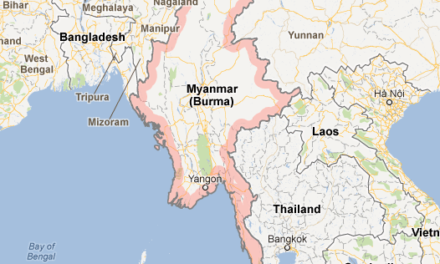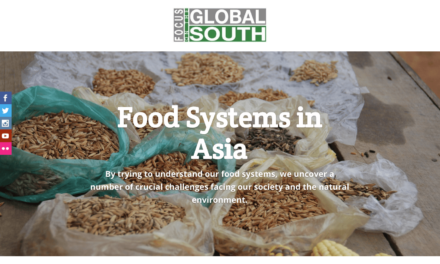By Walden Bello
The following is a statement drafted by Walden Bello and delivered at a joint press conference with economists Jayati Ghosh and C.P. Chandrasekhar on June 28, 1998, a day before the inauguration of former actor Joseph Estrada as president of the Philippines. The press conference was sponsored by Focus on the Global South and the Institute for Popular Democracy. One month later, in his State of the Nation Address, President Estrada admitted that the Philippines Treasury is bankrupt and the country faces economic collapse.
President Joseph Estrada’s ascension to office coincides, almost to the day, with the first anniversary of the beginning of the Asian financial crisis on July 2, the day in 1997 that the Thai baht was devalued and ushered in a period which saw the collapse of many of the economies of the Southeast Asian region. It comes at a conjuncture when the Philippines and other Asian countries stand on the “brink of a depression,” to use the words of World Bank senior official Jean-Michel Severino.
The question on everyone’s lips is: Will the Estrada presidency be able to provide the leadership that will rise to the occasion?
Effective political leadership has been shown to be the most scarce currency so far in the Asian currency crisis. Indeed, had there been more responsible leadership, both at the regional and national level over the past year, the Asian financial crisis could have been contained.
A Year Wasted
Valuable time was lost when, instead of acknowledging that volatile capital flows brought about by the liberalization of the capital account and financial liberalization had been the primary cause of the crisis, Washington and the International Monetary Fund (IMF) insisted that “crony capitalism” or corrupt relations between the private and public sectors was the main issue and that the solution lay principally in eliminating corruption and achieving “greater transparency.”
This misdiagnosis was coupled with a cure that worsened the disease. Instead of moving to decisively impose controls to calm down volatile capital flows, the IMF imposed standard austerity programs to curb spending, thus accelerating the contraction of economies already in decline by drastically reducing government spending that could have counteracted the sharp drop in spending by the debt-ridden private sector.
Instead of leading an effort to stabilise and reflate the region in a manner akin to the way it revived Western Europe with the Marshall Plan after World War II, Washington opportunistically seized the opportunity to use the IMF to advance its bilateral agenda for the region-that is, to batter down the tariff and investment barriers to US exports and investments.
And instead of standing up to Washington and the IMF to provide an alternative economic program to shore up the regional economy, Japan failed to live up to the rest of Asia’s expectations that it was prepared to take a regional leadership role when it yielded to Washington’s pressure to scrap its plan to set up the $100 billion Asian Monetary Fund (AMF) that would have defended the Asian currencies from investor panic and further speculative attack.
The deterioration of the Asian financial crisis stems from a massive failure of political leadership at the international and regional level.
Blindsided by Ideology
The vacuum of economic leadership at the regional level was paralleled by the abdication of leadership at the national level. If opportunism, lack of spine, and gross misreading of the situation were the main problems at the regional level, here in the Philippines, the failure of leadership is traceable to a combination of denial and doctrinal blindness. Allow us to illustrate by reference to our well-publicised year-long debate with the Ramos administration on the causes of and solution to the crisis.
o When the crisis first broke out in July, my colleagues and I warned that the Philippines and Thailand were “Siamese twins.” That is, because the government had followed the same formula of capital account and financial liberalization, high interest rates, and fixed exchange rates as the Thais, the country was exposed to the same destabilising consequences of the panicky exit of speculative capital. However, the Ramos administration insisted that the Philippines would not be severely hit by the crisis because its economy had different “economic fundamentals.”
What settled the debate was the foreign investors’ rapid exit from the country, which brought down the value of the peso by almost 20 per cent in the two weeks since July 11, the day the peso was floated.
o At a press conference we called in September last year, when the exchange rate was still 32:1, we predicted that the peso would fall to over 40 pesos to one dollar by December. The administration’s technocrats angrily branded us “doomsayers,” “armchair economists,” or malevolent forces out to spook the foreign exchange markets.
In mid-December, the peso passed the 40:1 mark.
o Earlier this year, we projected that by mid-year, the inflation rate would be up to 10-12 per cent, unemployment would be 13-15 per cent, and GNP growth would most likely be zero in 1998. We further said that there would be a bubble economy during the election period owing to the inflow of capital to finance the elections, but that there would be a rapid deterioration of the economy soon after. Officials of the Ramos administration dismissed us once more as professional pessimists, maintained that the situation had “stabilised,” and insisted that inflation would only be at six per cent and the GNP in 1998 would still grow by four to five per cent.
Unfortunately for them and unluckily for the country, the latest figures and trends are as we anticipated.
By persisting in denial mode for a whole year and, till the very end of its term, repeating ad nauseam the line that owing to its policies, the Philippines was in better shape than its neighbours, the Ramos administration became itself a key factor worsening the crisis. Instead, what passed for policy was a stance of refraining from doing anything. This was not out of stupidity or from paralysis, but out of ideology, out of doctrinal belief that market forces would rectify the situation and restore economic equilibrium. In this view, government intervention would only make matters worse.
A Catalogue of (Avoidable) Errors
Let us review the sad list of errors and shortcomings:
o No mechanisms were put in place to seriously defend the currency from a further freefall.
o Little effort was expended to more effectively collect taxes and increase other government revenues to mount a program of massive government spending to counteract the contraction of private investment. Instead, the administration promised the IMF that it would force government agencies to save 25 per cent of their budgets in order to achieve a budget surplus in 1998. The result of this mix of inaction, miscalculation, and wrongheaded policy is a P5.8 billion budget shortfall for the first five months of this year that the Ramos administration has bequeathed the Estrada government.
o No safety nets were put in place to protect the thousands of people now being thrown off their jobs as the effects of the financial crisis whip rapidly through the real economy.
o Moreover, when the government did intervene, it was either too late, as when it decreed in mid-1997 that commercial banks’ exposure to real estate loans should be limited to 20 per cent; or its intervention only made things worse, as when it implemented the IMF’s prescription to keep interest rates high. This policy of high interest rates has driven hundreds of businesses-big, medium, and small-to bankruptcy, and the rate of closures will escalate in the next few months.
Having said all this, we would like nevertheless to state that there is no satisfaction in being proven right. There is no joy in having won the policy debate with the Ramos administration. There is only one thing worse than being tagged a prophet of doom, and that is being a “doomsayer” whose projections have come to pass.
Apprehensions
Looking at the debacle to which Mr. Ramos’ denial syndrome and non-policies have led, one would expect Mr. Estrada to make a drastic break with the previous administration’s approach. So far, however, there is no indication that Mr. Estrada’s team realises that it is these very policies that have created the current crisis.
We worry when Mr. Estrada says that he will continue Mr. Ramos’ program of financial and trade liberalization, when it is precisely the indiscriminate liberalization of our capital account and financial liberalization that is the root cause of the problem.
We worry when Mr. Estrada says that the task is to make the Philippines “globally competitive” against its neighbours, when the task is precisely for the Philippines to get together with its neighbours to coordinate capital controls, exchange rate policies, and expansionary macroeconomic policies to strengthen our collective hand against the unfettered freedom of finance capital to enter and exit from our individual economies, which has been the cause of so much regional destabilisation.
We worry when we hear Mr. Estrada’s advisers say that the solution lies mainly in having an exchange rate that will make our exports more competitive in advanced country markets vis-a-vis exports from China, Malaysia, and Indonesia. Not only is this approach very narrow. It promotes a “beggar-my-neighbour policy” that only weakens all of our countries collectively vis-เ-vis foreign capital, the US, and the IMF.
We worry when Mr. Estrada says austerity and sharply reduced government spending is the way out of the crisis, since this will merely eliminate government spending as a countercyclical mechanism to arrest the decline in the private sector investment and activity. This IMF approach, it is now conceded even by the economists at the IMF’s sister institution, the World Bank, is what is turning a regional recession into a regional depression.
We worry when Mr. Estrada’s people propose further liberalization of the foreign investment code, foreign landownership, and the sale of government enterprises to foreign interests when there is very little evidence that in exchange for parting with these national assets we will get much capital and greater efficiency. Owing to the collapse of our currencies, US and European investors are engaged in a frenzied buying binge throughout Asia that is giving them significant control of key sectors of our neighbouring economies. The pressure to open up our property market and loosen our investment code is part of this trend. It is a development that is very dangerous from the viewpoint of national security and economic security. Mr. Estrada, who helped kick out the US bases, must heed Malaysian Prime Minister Mahathir’s warning that what is occurring is tantamount to a new wave of colonialism.
Needed: A Bold, Innovative, and Imaginative Program
What the times call for is a bold break with the policies of the past and a comprehensive and strategic program to replace the failed paradigm of globalization.
o Immediately, a set of measures and policies must be put in place to stop the economy’s downward spiral.
Foremost among these are government action to bring down interest rates and increased government spending, even if this entails significant deficit spending.
Hand in hand with these expansionary policies must be:
– institution of temporary foreign exchange controls aimed at stabilising the value of the peso against speculative activities;
– the imposition of measures that would promote macroeconomic stability by discouraging the entry of destabilising speculative capital such as Chile’s requirement that 30 per cent of the value of foreign loans or portfolio investment must be deposited in an interest free account at the Central Bank and not be withdrawn for a year; and
– a suspension of the trade liberalization program to prevent our industries and agriculture from being swamped by dumping from countries that are unscrupulously seeking to export their way out of depression and to raise revenue from customs duties to support increased spending.
All these measures, of course, go against the thrust of IMF stabilisation programs, but it is time anyway to discard these programs since they are simply making a bad situation worse. In this regard, this is probably the most opportune time to declare independence from the IMF since its approach is under attack from all quarters these days, including the US Congress which has so far withheld further funding of the institution owing to, among other things, concerns about the effectiveness of its programs.
o These short-term measures must be put into motion as part of a broader strategic program of reorienting the economy away from the indiscriminate integration into the global economy that is the current doctrine. Central are measures that would greatly reduce our dependence on foreign capital and foreign markets. The idea is not to close ourselves to the international market. It is to make capital raised from local sources the main source of investment capital. It is to make the domestic market rather than foreign markets the main stimulus of growth. What this would mean would be, on the one hand, serious efforts at progressive taxation, at drawing the resources for development from our own elites. On the other hand, it is to create domestic purchasing power through asset redistribution, particularly land reform.
Greater equity is the key to a virtuous cycle of economic growth that is built on the foundation of domestic resources and an expanding domestic market. The wealth of the elite of a country which has one of the worst distributions of income in Asia (a Gini coefficient of 42.9, compared to, say, India, 29.7) is vast. What is absent so far is the political will to redistribute it. Is it the Estrada presidency that will finally provide this?
Regional Solidarity: A Sine Qua Non
o The foregoing domestic measures will not be sufficient to reverse recessionary pressures unless they are coupled with measures of economic cooperation with our neighbours. Whether we like it or not, our economy is integrated, in terms of trade, investment, and industrial structure with the economies of our neighbours. We will either hang together or hang separately, as the Americans say. Following are some urgent cooperative measures:
– At the regional level, we need to get together to coordinate our exchange rate policies, macroeconomic policies, and strategies to manage the massive foreign debt that has been incurred by our private sectors. We cannot allow the big international banks to pick us off one by one as they did to many developing country debtors in the 1980’s, during the Third World debt crisis.
– While domestic markets remain the central markets and engines of growth, the opportunity of enlarging the markets for our goods and strengthening our collective productive capacity through carefully planned regional integration must be explored. ASEAN as well as a larger East Asia Economic Grouping that systematically favours the region’s producers and consumers must be made into a reality once and for all.
– At the international level, our government must move together with other governments to institute what is now universally acknowledged to be a necessity but which Washington and the IMF continue to block: a “Tobin Tax” that would be levied on capital movements across borders in order to slow down and control the irrational movements of speculative capital, as well as raise a global fund for development.
Finally, global and regional cooperation rather than “global competition” – as Mr. Estrada put it the other day–is the crying need of the hour. Being newly elected and untainted by association with old policies, Mr. Estrada, like President Kim Dae-Jung of Korea, is particularly well-positioned in terms of legitimacy to help lead this quest for regional and international cooperation. Essential to this effort must be a vigorous effort to persuade China–the one country that has acted in a responsible fashion throughout the crisis by resisting the temptation to devalue the yuan–to stand together with its East Asian neighbours in a collective defence against the depredations of speculative capital, the wrongheaded policies of the IMF, and pressures from the United States.
TINA, Mr. President
Needless to say, the foregoing strategy is going to be tough to achieve in the face of domestic and international forces that are behind the dominant paradigm of indiscriminate globalization. But to borrow a phrase from Margaret Thatcher during her crusade for (wrongheaded) free-market policies in the 1980’s: “TINA, Mr. President. There Is No Alternative to the program of active domestic intervention and
international and regional cooperation we have outlined above.”
Continuing along the same road of globalization, financial liberalization, and self-imposed deflation prescribed by the IMF and followed by the Ramos administration is very likely to result, by the end of 1998, in a 20 per cent unemployment rate, a 20 to 25 per cent inflation rate, a 50-55 pesos: 1 dollar rate of exchange, and a negative GNP growth rate (probably – 2 to -3 per cent) by the end of the year.
At most, the Estrada presidency has two to three months to contain the current economic crisis, to prevent the recession form turning into a full-fledged debacle. The previous administration has left it very little room for error.
*Dr Walden Bello is professor of sociology and public administration at the University of the Philippines, co-director of Focus on the Global South, a regional analysis and advocacy center based at Chulalongkorn University in Bangkok, and national chairman of the political party Akbayan. He is also the author of a number of books, including Dragons in Distress: Asia’s Miracle Economies in Crisis (London: Penguin, 1991).









